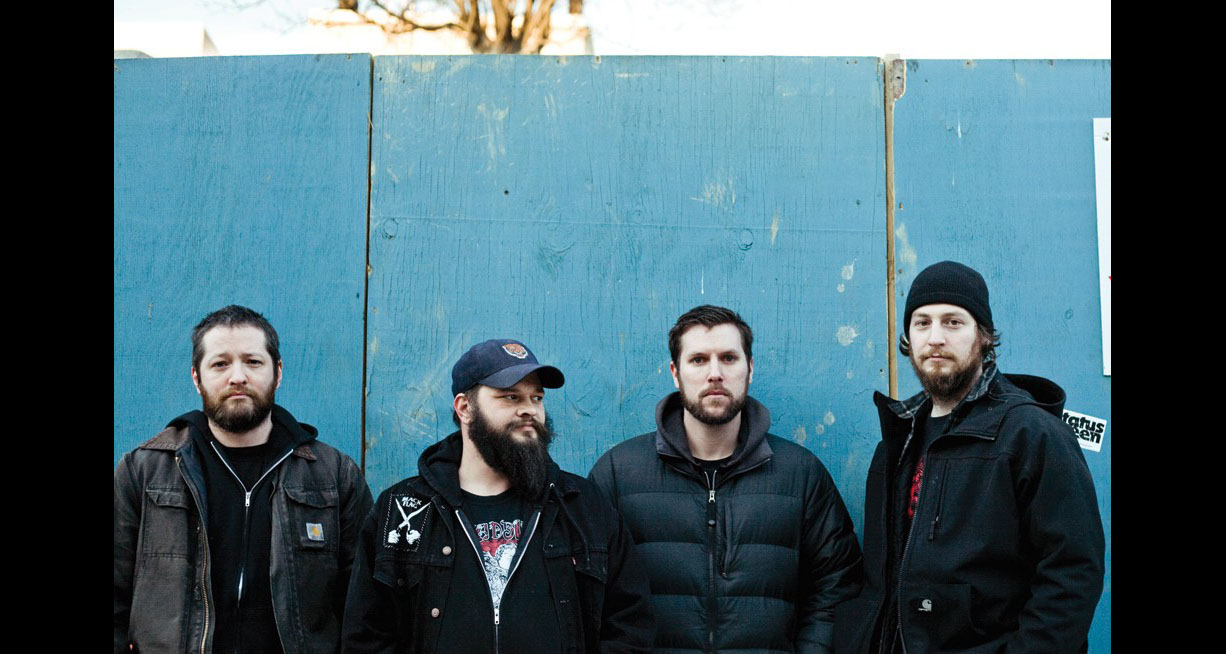 Ocean: Pantheon of the Lesser (Important, 11/11/08)
Ocean: Pantheon of the Lesser (Important, 11/11/08)
Ocean: “The Beacon” (excerpt)
[audio:https://alarm-magazine.com/wp-content/uploads/2011/06/beacon.mp3|titles=Ocean: “The Beacon”]Consider this partial list of bands: The Ocean, The Ocean Collective, Ocean Floor, The Ocean Floor, The Ocean Floor Orchestra, Ocean Chief, Oceano, Ocean (1970s), and Ocean (2000s). Watery band names are almost as ubiquitous as the substance for which they’re named. Oceanic imagery is inescapable.
Portland, Maine’s Ocean is particularly suited to ferry its moniker. The doom quartet made a leviathan of a debut with Here Where Nothing Grows in 2005, and it has since become one of the most prominent heavy bands in its home state. Its slow, feedback-drenched creations slowly crumble conscious thought over the course of 20-minute songs. These songs are a collection of delicate counterbalances: dissonance and melody, harsh gales and mellow currents, and despair and hopefulness. “Our sound is not for everybody, nor should it be,” says bassist Reuben Little. “If you like it, you like it; if you don’t, you don’t.”
The band’s connection to the ocean is both geographical and personal. “I live 300 yards from the ocean,” Little says. “We all live really close; Portland is a peninsula. It’s a huge, vast, empty thing, or it’s this beautiful entity — it just has so many different meanings for us because we grew up in this culture.” An ex-fisherman, Little imposes no singular meaning on the sea. “It’s just this entity that’s huge and mysterious,” he says. “It gives life and takes life, and it’s really close to being all things to all people in Maine. Everyone has some relationship to it. I just thought, ‘What a great name.’”
However, the similarity of Ocean’s name to Germany’s progressive metal purveyors The Ocean has created some confusion. “Our first records came out at exactly the same time, and were being reviewed in the same magazines,” Little says. The Germans contacted the quartet about relinquishing its name, but it was too late. “At that point, we had already recorded and released the demo that became Here Where Nothing Grows,” Little says. “We had merchandise with our name on it — it was the name of the band. Is it great that there are two bands with the same name? No. Is it worth starting over again? I don’t know.”
“It’s just this entity that’s huge and mysterious. It gives life and takes life, and it’s really close to being all things to all people in Maine. Everyone has some relationship to it. I just thought, ‘What a great name.’”
Though the inlet for the wall-of-droning-amplifiers approach may have been carved by modern doom-lord Sunn O))), Ocean ups the ante by eking out dynamic song structures that channel despair into surprisingly melodic catharsis. Strangely, critics are more wont to compare the band to Canadian post-rock band Godspeed! You Black Emperor. “The biggest Godspeed connection is simply the length of the songs,” Little says. “I mean, sure, sometimes we have a sweeping, ‘indie post-metal or whatever’ kind of feel, but we didn’t set out to rip them off.” Even at its heaviest, Godspeed never dredged the harsh, dissonant, despairing depths to which Ocean plunges.
Ocean’s 2008 effort, Pantheon of the Lesser, is even more sophisticated than its predecessor. Although the album consists of only two songs, they’re both fantastic. First is “The Beacon,” a nearly 36-minute behemoth. The second track, “Of the Lesser,” is equally as massive and sprawling. “It’s never a conscious decision that ‘this song has to be 20 minutes long,’ but from early on, we realize that’s the way it’s going to come out,” Little says.
The writing process likewise is lengthy and consists of extended jams over months at a time. “Some of the stuff [on Pantheon of the Lesser] had been around as ideas, riffs, sketches for a while, but I think it was pretty much 2006,” Little says. “That was the big year for writing. We’re not workaholics by any means, but when you’re doing this stuff, it’s nice to demo it, let it sit for while, and listen with fresh ears as close as you can be to a listener.” This often results in entire rearrangements of compositions.
“Songs are such weird things,” Little elaborates. “They’re precious, but they can’t be too precious — you can’t be too attached to one little thing if it holds back the rest of the song.” As for their length, Little asserts that each song is worth the time. “[Our songs] ask a lot of the listener. They’re an experience to listen to, and we try to give people little surprises, treats, and pinnacles, as well as big payoffs.”

